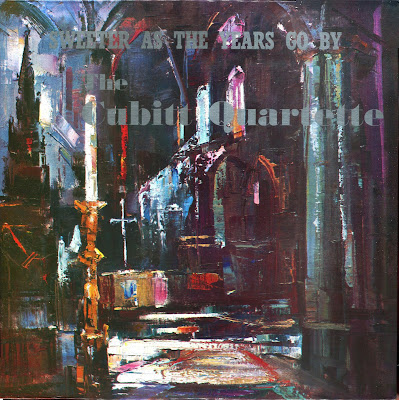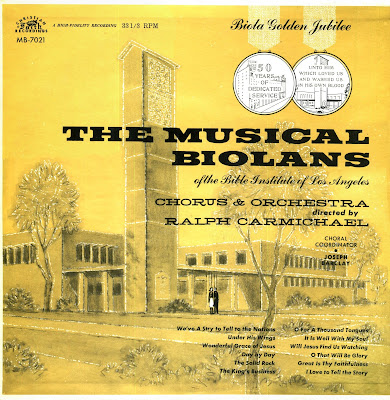In answer to, "How can they be a quartet when there are five of them?" the answer is that Hovie Lister (center, I believe) is the pianist. As far as I know, though, there are, in fact, gospel "quartets" that feature a fifth voice, but I find that totally reasonable, since five-part close harmony is basically just dressed-up four-part harmony. That's just my take, though.
I considered trying to restore this jacket, but I figured it would take a lot of work, with a high probability of disaster. My main concern was that, even if I could soften the masking tape adhesive with my hair dryer, Goo Gone might not clear up the residue. So I decided to keep things as they are and simply be happy with a great 1957 Southern quartet LP for 99 cents.
1957 was the Statesmen's ninth year as a group, and, if you haven't heard these guys before, they're pretty much the personification of Southern gospel quartet singing. In fact, they're the epitome of that style even if you have heard them before. I'm talking virtuosic, extroverted, deeply felt, borderline-melodramatic, and purely "good old" sacred singing of the earn-your-own-radio-show type--and the Statesmen, founded in 1948 by Lister (and originally featuring the no-relation Mosie Lister), indeed had a syndicated radio program. It was called Singing Time in Dixie and it was hosted by Nabisco. Maybe Nabisco liked the group's superbly crisp style of harmonizing.
Today's playlist offers an excellent balance between toe-tapping classics like E.M. (There'll Be Shouting; Victory in Jesus) Bartlett's Everybody Will Be Happy Over There and soulful, Elvis-style slow numbers like He's Everywhere, and there's even an example of what can only be called gospel doowop, at least during the start of the track--I refer to Journey's End, one of the showcases for bass Jim "Big Chief" Wetherington, who, in addition to singing astonishingly low throughout this LP, composed the third track, Lord, I Want to Go to Heaven. Interestingly, that song is a showcase, not for Jim, but for one (or both) of the group's tenors, Denver Crumpler and/or Jake Hess, though Jim gives himself a memorable closing cameo. I wish the album notes had used the traditional lead/tenor/baritone/bass designations so that we'd know who's doing the high melody voice on these tracks. Then again, there are two styles of TTBB harmony in that regard--one, in which the lead takes the melody, and the other, in which the "tenor" takes it. So... there we are. We know it's Denver or Jake doing the melody parts, and, for no particular reason, I'm guessing Jake.
Baritone Do Ott is the member I haven't mentioned yet, so... now I have. Like the rest, he's great--I mean, these guys are so accomplished, it's almost ridiculous. I'm paraphrasing what my foster father said, years ago, as he inspected a Dual 1229 turntable I'd bought for eight bucks (!) at an antique show--"This thing is so well built, it's ridiculous."
The notes seem to refer to this as the Statesmen's first long-playing album, so there you have it. Or I have it, anyway. And this LP got a lot of plays from its former owner(s), which is why my first rip--with a regular LP needle--didn't come out so good. No way I could adequately denoise it. But this is why God created 1.2 mil mono styli--a second rip with my wider needle saved the day. And the music. The tracking difference was astonishing. And I'll always wonder if I could have removed the masking tape without disaster. I'll have to experiment on a cover I don't care about. I'll just slap some masking tape on the seams, wait about 60 years, then see whether or not the hair dryer/Goo Gone treatment works. I'd better get started.
Meanwhile, to the gospel...
DOWNLOAD: The Statesmen Quartet with Hovie Lister (RCA LPM-1411; 1957)
Glory, Glory, Clear the Road
Journey's End
Lord, I Want to Go to Heaven (Wetherington)
My God Is Real (Yes, God Is Real)
Led Out of Bondage
Guide My Feet
I Wonder What My New Address Will Be
One of These Mornings
He's Everywhere
Everybody Will Be Happy Over There (Bartlett)
Hide Me Rock of Ages
I Know It Was the Lord
The Statesmen Quartet with Hovie Lister (RCA LPM-1411; 1957)
UPDATE: Below is Buster's Photoshop rescue of today's cover. Thanks, Buster!
Lee




















